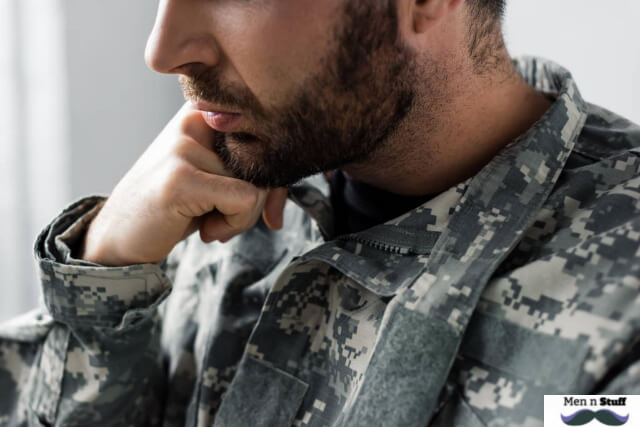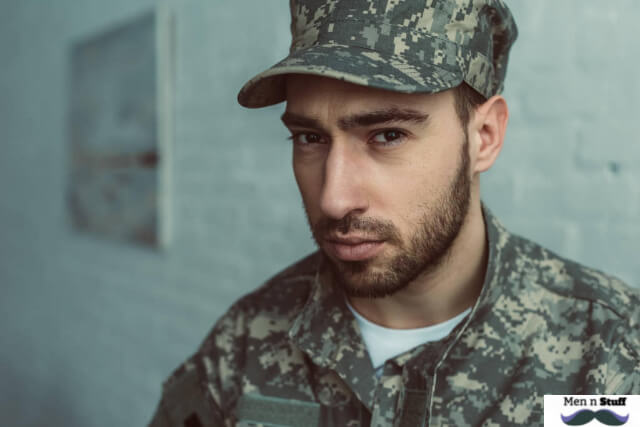Your childhood friend Jake says that his uncle, an army officer, recently returned from the base. He heard him talking about shaving profiles which he didn’t fully understand. Since the subject is also new to you, you can read much about shaving in the army.
A shaving profile is like granted permission in the army and other DoD aspects like the Navy. Individuals with underlying skin conditions can get a medical exemption that saves them from the no-hair directives of the services.
In this article, we will see the ins and outs of the shaving profile. So, stick around till the end to get all details and answers to related questions.
MenNStuff 101:
Shaving profiles are also called shaving waivers.
What A Profile Is And The Different Types
From Quora, you’ll learn that profiles are excuse slips that soldiers get. Those slips allow them not to conform to the expectations required of other soldiers. In our case, a shaving profile exempts a serviceman from trimming his facial hair.
Military doctors mark profiles using the numbers 1 to 5 along with the following areas:
1. Pulmonary
2. Upper extremities
3. Lower extremities
4. Hearing
5. Eyesight
6. And psychiatry
A 1 in hearing means that the soldier has no condition that would limit his performance. For a 2, the soldier may have a temporary issue and 3 to 5 points to severe mental or physical limitation.
Example: If a soldier gets a 2 in eyesight, he’ll need corrective lenses to achieve an accurate vision.
Explaining Shaving Rules
Most services under the DoD (Army, Navy, Air Force) have hair-related rules for its members. Specifically, they expect the men soldiers to have zero hair on their face, except a neat mustache. Of course, all that applies when they are in uniform.
And where does this rule come from? Well, dress and personal appearance in the military have these five elements:
1. Military image
2. Uniformity
3. Safety
4. Cleanliness
5. Neatness
The no-visible facial hair rule helps to keep the military uniform (the same), all members are neat, and the team clean.
But it doesn’t apply to everyone. The profiled members can grow their facial however they want.
How Do You Get A Shave Profile In The Military?

For the army to exempt you from shaving, a doctor needs to show proof that you suffer from any of these two conditions:
1. Pseudofolliculitis barbae (PFB)
2. Acne Keloidalis Nuchae (AKN)
Briefly, let’s see what each condition holds:
1. PFB (Also Known As Reazor Bumps)
PFB is an inflammation caused by constant shaving. Regularly, shaving between periods is ideal because it doesn’t pressure the epidermis. But, if it happens every 24 hours, the entry and penetration of the skin will cause a reaction. Thus, the everyday shaver will experience discomfort.
2. AKN
This condition is like PFB, except that it affects the upper neck. For AKN, however, the effect is long-lasting, and it causes thickening of the affected area.
Anyone who comes down with any of these two conditions is eligible for a waiver.
For How Long Do Shaving Waivers Stand?
Up to 5 years.
In June 2020, the Surgeon General of the Air Force extended the profiling to 60 months. That way, the servicemen can serve longer. But, the Air Force continues to urge airmen not to get waivers if they don’t need to.
What Army Regulation Covers Sharing Profiles?
Army Regulation 670-1 1-8 2 (c)
And here’s a snapshot of the exact words:
How Shaving Profiles Affect Military Men
From a study, 21.4% of Air Force men said shaving waivers negatively affect their careers. They believe that since they don’t conform to the military standards, they’re passed over by awards and leadership opportunities.
Simply put, the non-shaving officers say that they’re being discriminated against.
If you look at the officers’ ethnicity, most of them are black (63%). The others are 18% White, 14% Hispanic, and 5% Latino.
So, are shaving profiles bad or good?
For the service members with PFB and AKN, shaving profiles help them feel more comfortable as they serve. But, according to the study above, the waivers seem to stall their career progression. So, it takes longer for them to be promoted, as they’re seen as a select group of non-conformists.
Do You Have To Shave Every Day In The Army?
Yes.
Unless you’re under a shaving waiver (profile), each day is razor day. For example, the Navy says that even the littlest whiskers can hinder the effectiveness of breathing devices.
Why Do Special Forces Have Beard?

For Special Forces, beards are essential for executing covert intelligence operations. Because of their unique roles, they get leeway.
Also, other service members have facial hair based on their religion. For example, the military exempts Muslim and Jewish soldiers from shaving their beards, except that they groom them.
Does the Army Allow Mohawks?
No.
Mohawks, or Landing Strip, is not an allowed hairstyle. Other unwanted fashions include the teardrop and the horseshoe.
Here’s an image to clarify:
COURTESY: ARMY.MIL
Can Females Have An Undercut In The Army?
No.
Katelin Corgnati | UNSPLASH: UNDERCUT ON A FEMALE
But earlier this year, female soldiers were allowed more hairstyles. The fresh additions include locks, ponytails, and braided twists.
The new policies, which didn’t apply before February 25th, were an effort to improve gender and racial equality in the service. Looking back, women soldiers had been struggling to wear buns and place their helmets correctly. So, they spoke to their seniors, who listened and approved the changes.
Can You Wear A Ponytail In The Army?
Yes.
Conclusion
Well, that’s pretty much it with shaving profiles and facial hair in the army. But naturally, you expect the military to have regulations, so it’s no surprise that hair can mean so much when you’re donning the uniform.
To get a shaving profile, a service member will need a doctor’s approval. That way, his seniors will approve, and he’ll stay away from the razor for a while.
Now, you and Jake know what his uncle was talking about, and so much more!
If you liked the read, be sure to share the link with other curious minds. Also, leave your comment or question in the boxes below. As you exit, check out these other exciting topics:
1. Can you shave with a pocket knife? Make your shaving easy anytime & anywhere.
2. How to get rid of scars after-shave? Tips for healing scars after shaving.
3. Why do my legs itch after shaving? Itching is a mystery; solve it
4. How to take apart a shaving razor? Procedure to apart the blades from razor.
5. Best shaving kit for men | Enjoy all the essentials of a smooth shave in one convenient pack
Much love, and see you soon in the next one!

